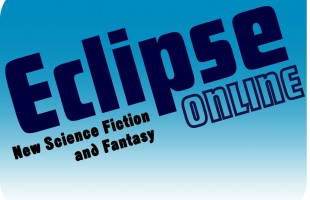 Eclipse Online #4, January 2013
Eclipse Online #4, January 2013
Reviewed by Daniel Woods
“The Amnesia Helmet” by F. Brett Cox
At the Rialto theatre, Buster Crabbe is back on the big screen, and Marlena and her friends can’t wait to see the great actor in his latest role: Buck Rogers. Space adventures, crazy gizmos, strong female characters who wear trousers and don’t wait for the menfolk to save them – it’s everything a kid wants to see, and Marlena can’t help getting caught up in the movie magic. But when her imagination turns harmless pretending into something more sinister, Marlena, Pete and Johnny find themselves peeking into the gritty world of adults. What they find, even if they don’t understand it, is quite different to the world portrayed on their cinema screen.
Set in the ’30s (ish), when cinema was still new and exciting, Brett Cox’s piece is about the interaction between childhood fantasy and reality. It all gets tied up in the Amnesia Helmet, an artefact originally seen in Buster Crabbe’s movie, which Marlena “imagines” into the real world. No prizes for guessing what it does. Regrettably, the story fails to make any real impact. The characters feel undeveloped through pages of listless dialogue, and although Marlena’s interaction with the “adult world” provides some interest, Cox does it with sex (an implied child abuse scandal, the unrecognised sound of Marlena’s parents having sex in the next room, etc.), and that is uncomfortable to read. Aside from this, the implications of the titular helmet are never explored – none of the characters, child nor adult alike, seem to grasp the enormity of a “forgetting device,” and that becomes quickly frustrating. There is the odd bit of amusing back-and-forth between the children to make you smile, but frankly, if Cox’s story were to be stripped of the Amnesia Helmet and several of its main characters, I’m not sure anyone would notice the difference.
“The Advocate” by Genevieve Valentine
“I’m sorry, the Martian ambassador isn’t open to visitors at this time.”
The embassy is still under construction, and Siphiwe spends most of her day deflecting the world’s collective enquiries, but it’s official nonetheless: life exists on Mars, and an extra-terrestrial ambassador is in residence on First Avenue, NYC. Problem is, this particular life form is so alien that nobody quite knows how to proceed, Siphiwe included.
As you read it, you’ll quickly begin to suspect that “The Advocate” is a tale of political machinations, not aliens, and a fictitious Martian diplomat. And you’ll be right. Unfortunately, this realisation kills the story. There is no intrigue, because there are only two possible endings: either Siphiwe gets rumbled, or she pulls off a spectacular ruse and nobody suspects a thing. In such cases, it is still possible to have a decent ride along the way, through the excitement of will-she-won’t-she, but for that you need strong characters. Mysteries to untangle. The Advocate boasts none of these, and the sad thing is, it could have been quite an interesting piece if Valentine had chosen to explore her story’s core idea – a “Martian” as a collective entity, made up of tiny living organisms – rather than dismiss it at the start.
“The Advocate” attempts to be a cerebral thriller: a political puzzle for the enjoyment of those with agile, subtle minds. In actuality, it is a predictable tale about a woman who keeps a fallacy alive by juggling scraps of information. There is also some light eco-moralising to enjoy; Valentine disapproves of extinction and terraforming (read: industrial development, deforestation, global warming, destruction of habitats, exploitation of Mother Earth and so on). It is the better of the two in this selection, certainly, but a few good, neglected ideas are not enough to make “The Advocate” a great piece of fiction.